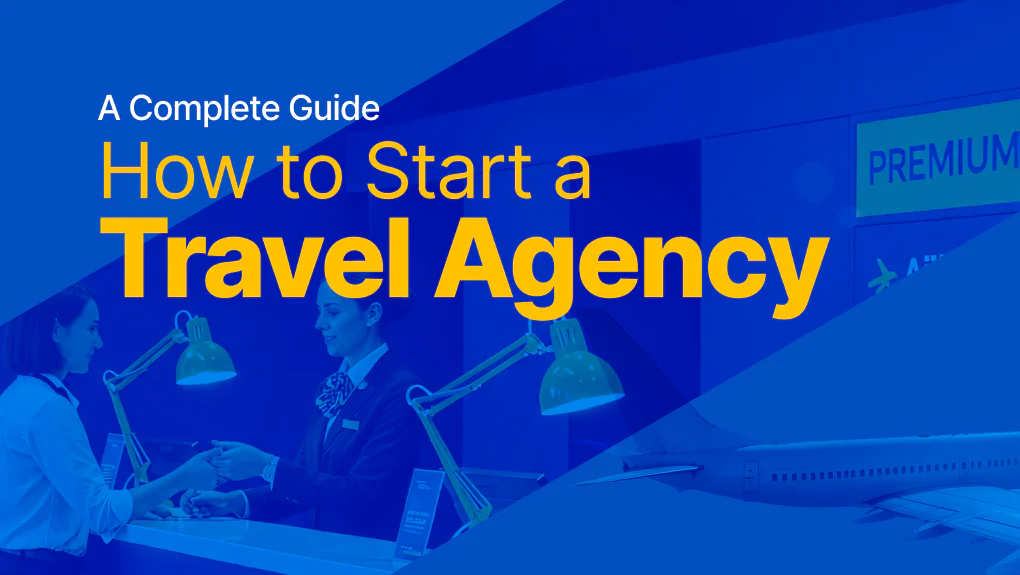Best Time to Visit the World’s Top Tourist Destinations
January 5, 2026
![]() 6 min read
6 min read

Starting your own travel agency is both exciting and timely. The U.S. travel industry is projected to generate around $1.35 trillion this year, with more people seeking personalized trips. This makes the role of independent agencies more valuable after the post-pandemic.
So, how to start a travel agency in 2026? It requires setting a clear vision, choosing a business structure, meeting state and federal requirements, planning finances, and finding your first clients.
Many entrepreneurs begin from home or online with minimal costs, while others scale with offices and niche services. In this guide, you’ll know every step, from building skills to future-proofing your agency with technology.
Decided on starting a travel agency? It means you need to have a clear vision, a long-term goal, and lots of patience to move along the plan. Having a step-by-step guide will help you move forward with your goal efficiently. Here are 11 steps on how to start a travel agency in 2026:

Starting a travel agency is more than filing paperwork or setting up systems. It begins with defining your purpose.
Why do you want to start this business? Is it the freedom of entrepreneurship, the chance to share your love for travel, or the opportunity to serve a growing market? Clear answers give you direction when choices become difficult.
Your vision acts like a framework. Here’s how to make your vision practical and strong:

Before investing money or time into your agency, you need to understand the travel market. Market research is not only about identifying demand but also about seeing where you can stand out.
So, how to conduct market research effectively? Here are some tips:
Look into current U.S. travel trends such as solo travel, luxury experiences, wellness tourism, or family vacation packages. Reliable reports from IBISWorld or the U.S. Travel Association can provide updated insights.
Identify who your ideal clients are. Are they young professionals, families, retirees, or adventure seekers? Different groups have different travel priorities and budgets.
Check both online travel agencies (like Expedia) and local independent agencies. Note their pricing, services, and marketing tactics. Find gaps you can fill.
Many travelers now prefer booking online and researching extensively before contacting an agent. Knowing how digital habits affect purchasing is key to tailoring your offers.
Conduct surveys, run small polls on social media, or interview potential travelers in your area to test your assumptions.
Running a travel agency comes with real challenges. Here are some of the most common, along with practical solutions:
Overcome by finding a niche (such as eco-tourism, cruises, or adventure packages) instead of competing directly with giants like Booking.com.
Reduce risk by staying updated with travel reports and diversifying your service offerings. Do not rely on a single type of package.
Have flexible policies, promote local travel, and keep operating costs lean to survive periods of reduced demand.
Build credibility with certifications, partnerships with reputable providers, and strong client testimonials.
Keep yourself informed about state and federal travel regulations, especially if you are offering international packages.
Your travel agency business model is more than a concept. It is the practical structure that defines how your agency will operate, make money, and serve clients. A clear business model ensures you can start strong and grow efficiently.

Starting a travel agency in the U.S. means complying with both state and federal laws. This isn’t just about filling out forms; it’s about making sure your business is legally protected, financially compliant, and contractually secure. Below are the core legal steps to follow:
For your travel agency business structure, you can choose between three common and popular structures in the USA. The business structures are as follows:
A sole proprietorship is the simplest structure where one person owns and runs the business. There’s no legal separation between the owner and the business, so profits and debts are tied to the individual.
An LLC is a separate legal entity that protects its owners, called members, from personal liability. It combines the liability protection of a corporation with the flexibility and tax options of simpler structures.
A corporation is an independent legal entity owned by shareholders and managed by a board of directors. It can own property, pay taxes, and raise capital, but it comes with more rules, costs, and paperwork.
| Feature | Sole Proprietorship | LLC | Corporation |
| Legal Entity | Not separate | Separate legal entity | Separate legal entity |
| Liability | Unlimited (personal assets at risk) | Limited liability (personal assets protected) | Limited liability (personal assets protected) |
| Taxation | Pass-through to owner | Pass-through (default) or corporate tax option | C-Corp: Double taxation, S-Corp: Pass-through |
| Setup Cost | Low (no formal filing) | Moderate (state filing + fees) | High (complex filing + ongoing costs) |
| Management | Owner-managed | Flexible (member or manager-managed) | Board of directors and officers |
| Ease of Raising Capital | Difficult | Moderate | Easiest (can issue stock, attract investors) |
| Best For | Small, low-risk businesses | Small-to-medium businesses seeking liability protection | Larger or fast-scaling businesses |
To launch legally and protect yourself, here’s what you need to do and how. This step ensures you follow the requirements for setting up a travel agency in the U.S:
Tips: If you’re unsure, check your state’s official website or contact your local business office for confirmation.
| States Requiring Seller of Travel Registration | States with Other Regulations (No SOT) |
| California | Delaware (occupational license) |
| Florida | Louisiana (retail agency licensure) |
| Hawaii | Illinois (disclosures/trust account rules) |
| Washington | Massachusetts (disclosures) |
| (Iowa used to, but repealed) | New York (Truth in Travel Act) |
Running a travel agency involves risks from booking errors to client disputes or trip cancellations. Having the right insurance for travel agencies protects you financially and builds trust with clients. Here’s what to do:
Beyond government registration, contracts are essential to protect your agency from disputes and liability. According to ContractsCounsel, the key legal documents include:
Tip: Work with a lawyer to customize these documents. Even if templates exist, tailoring them to your business avoids future disputes.
You should keep finances separate to simplify taxes and maintain legal protection. Use your EIN to open a dedicated business checking account. Consider applying for a business credit card for agency expenses.
Understanding your travel agency startup costs is essential for creating a realistic business plan and avoiding unexpected financial pressure. Here’s what you need to focus on:
| Expense Category | Estimated Range (USD) | Notes |
| Business Registration & Licenses | $100 – $500 | Varies by state and business structure |
| Technology & Software | $300 – $1,200 | Booking systems, CRM, and accounting tools |
| Website & Branding | $500 – $3,000 | Domain, hosting, logo, marketing materials |
| Insurance Coverage | $400 – $1,500 annually | Liability, E&O, cyber protection |
| Office Space (optional) | $500 – $2,000 monthly | Skip if you run a home-based travel agency |
| Marketing & Advertising | $1,000 – $5,000 | Social ads, SEO, partnerships |
| Training & Certification | $300 – $1,000 | Travel institute courses or IATA accreditation |
| Emergency Fund | Variable | Recommended 3–6 months of operating expenses |
Starting a travel agency doesn’t always require a large budget. With the right approach, you can launch your business from home while keeping expenses close to zero. Here are some tips on how to start a travel agency in 2026 for free:
Partner with a host agency that provides booking tools, supplier access, training, and commissions. Many require little or no upfront fees, letting you earn on sales without high startup costs.
Skip renting an office. Run your agency remotely using a laptop, free scheduling tools, and a professional email. This keeps overhead close to zero.
Build social media pages, optimize a simple free website (e.g., WordPress or Wix), and join travel groups on Facebook or LinkedIn to attract early clients.
Specialize in a travel niche, such as honeymoons, adventure trips, or budget tours. A strong niche helps you stand out without needing a big marketing budget.
Some suppliers and industry groups offer free online training that adds credibility and improves your knowledge without costly courses.
Work with local tour operators and airlines that pay commissions per booking, so you don’t need upfront capital.
We’ve been telling you to pick a niche, as it is one of the smartest travel agency business ideas. But what are the popular niche options? How to choose one among a list of niches?
Instead of trying to sell “everything to everyone,” specialize in what you know best. Here’s a list of popular niche ideas for travel agencies:
You now know the popular types of options you have for travel agency purposes. Here’s what you need to consider for picking the right one:
You can open your travel agency in three ways: at home, online, or offline. But which one to choose? Here are some tips:
This option is best for budget-conscious owners. You save on rent, utilities, and overhead while gaining flexibility. Perfect for solo agents or those testing the waters before investing in an office.
If you want to create a nationwide presence with global reach from the USA, an online agency is the ideal decision. There are no geographic limits when you start an online travel agency.
With digital booking tools, automated invoicing, and social media marketing, you can operate 24/7 without the need for a physical space. This works best if your target market is tech-savvy travelers who value convenience.
Opening a physical office adds credibility and visibility, especially if you target local customers or high-ticket travel. It’s best suited for agencies planning walk-in traffic, group bookings, or corporate clients.
If you’re wondering what skills you need to become a travel agent, the truth is that both soft skills and industry-specific knowledge matter equally. The following is a list of skill requirements for beginners and how to obtain them:
Whether you’re learning how to start a travel agency in 2026 from home or online, you need to know how to find your customers. Here are some tips on landing your first client:
Your first clients often come from people you already know. Reach out to family, friends, coworkers, or community groups and offer to plan their next trip. Early word-of-mouth can give your agency credibility fast.
Think about searching in gyms, salons, wedding planners, or coworking spaces, anywhere your target audience spends time. A referral partnership (like offering them a small incentive for each client they send) can bring in steady leads.
A Facebook business page or Instagram account is enough to start. Share deals, travel tips, and client testimonials. You don’t need a polished website right away; consistency matters more than perfection. But to be present online with a unique identity and full control over the internet, we recommend you create a travel agency website.
Consider giving your first 5–10 clients a bonus (like a free itinerary add-on or discounted service fee). This creates urgency, helps you gain quick traction, and builds your portfolio of happy travelers.
Marketing is a must for finding clients fast out of your network and reach. Some effective marketing tips are:
Short travel reels, destination spotlights, or “budget hack of the week” posts work better than long posts. Keep it visual and fun; it’s perfect for Gen Z and millennial audiences.
Travel-related community groups are goldmines for free marketing. Share useful tips (not just promotions) so members see you as a trusted travel advisor.
Instead of spamming, create a free PDF like “Top 10 Affordable Honeymoon Destinations” and send it to anyone who signs up for your email list. This way, you collect leads and stay top of mind.
Attend fairs, expos, or even small community gatherings. Hand out travel-themed freebies (luggage tags, postcards, mini guides). These small touches make you memorable.
Don’t wait until you have a perfect brand kit, fancy ads, or a professional photoshoot. The fastest-growing agencies are often those that just keep showing up every week with content and conversations.
Pro Tip: Focus on your first 20 clients. They’ll give you testimonials, referrals, and proof that your agency works. After that, scaling becomes 10x easier.
Running a travel agency today is about creating seamless, personalized experiences powered by smart technology. The agencies that thrive in the next decade will be those that embrace digital tools, automation, and innovation.
Instead of manually piecing together flights, hotels, and tours, use AI itinerary planners and booking platforms that instantly generate tailored travel plans. This not only saves you time but also delivers the Netflix-style personalization clients expect, like “because you booked X, we recommend Y.”
Chatbots and AI-powered assistants can handle FAQs, payment reminders, and booking confirmations. This gives clients instant answers while freeing you up for complex requests. Agencies embracing this now are already seeing higher customer satisfaction scores.
These travelers live on their phones. Offer a mobile-friendly booking experience or even your own branded app. Features like push notifications for flight updates, mobile itineraries, and digital wallets keep you aligned with how younger clients already travel.
Gen Z trusts TikTok, Instagram, and YouTube far more than traditional ads. Partner with micro-influencers or use UGC (user-generated content) campaigns to showcase real experiences. Highlight “Instagrammable” spots in itineraries to catch their attention.
As you adopt new tools, make sure your agency has cybersecurity safeguards in place. Data breaches erode trust quickly, especially when you’re handling sensitive information like passports and payment details.
Pro Tip: Future-proofing isn’t about chasing every shiny new tool. It’s about choosing tech that matches your agency’s size, niche, and clients.
Once your agency is running smoothly, the next focus should be growth strategies that increase travel agency business profit. Profitability doesn’t come from just booking more trips; it comes from scaling smartly, diversifying revenue streams, and optimizing operations. Here’s what to do:
Loyal clients are more profitable than constantly chasing new ones. Create loyalty perks, referral discounts, or VIP service packages to encourage repeat bookings.
Upsell travel insurance, guided tours, or premium hotel packages. These often carry higher commission percentages and boost average client spend.
Negotiate better commission rates with airlines, hotels, and tour operators. As your booking volume grows, suppliers are often willing to give you higher payouts or exclusive deals.
Leisure travel is competitive, but group trips, destination weddings, and corporate accounts can bring bigger contracts and steadier cash flow.
Use software to handle invoicing, client communications, and reporting. Reducing manual work keeps your operating costs lower, which improves margins.
Dedicate a portion of profits to long-term growth. Paid ads, influencer partnerships, and content marketing can help you reach larger audiences and position your agency as a go-to brand.
Yes. You can start without experience, but training, certifications, or partnering with a host agency makes it easier.
Florida is best due to its tourism and cruise market, followed by California and Texas.
Registering your business, getting licenses, setting up supplier ties, and creating a marketing plan are some responsibilities you must complete before starting a travel agency.
If you ask how to start a travel agency in 2026, it is all about combining vision, legal setup, financial planning, and modern technology. Remember, success comes from building trust, choosing the right niche, and adapting to changing travel trends.
Whether you begin from home, online, or with an office, a clear roadmap ensures steady growth. Focus on client experience, scalability, and smart marketing to transform your agency into a profitable business.